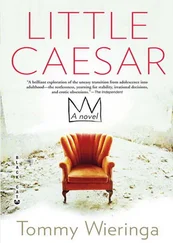‘Ah, I see,’ his sister said. ‘Well, things are going well here, thanks. All things considered.’
Silence rushed into the gap between them.
‘Tadeusz is going to school to become a mechanic,’ she said then. ‘The security business turned out not to be his thing.’
Beg was relieved to find her less defensive than her son.
‘He kept falling asleep all the time.’
‘Who?’
‘Tadeusz. The night shifts were too much for him.’
A lazybones, just like his father, Beg thought.
Eva still drove a streetcar; it hadn’t been easy for her, working such irregular hours and raising a child alone, but now that Tadeusz was grown up she was her enjoying her independence.
‘No man for me, never again,’ she said. ‘All a bunch of big babies.’
They didn’t talk about the things that had created the rift between them; they both wanted to ignore that. Maybe, Beg thought, the cause had become trivial. Maybe she was as lonely as he was.
He brought up the song about Rebekka and the roses, and said: ‘I sing it sometimes, it’s so weird, it just popped into my mind. Do you remember it?’
It was nice to hear her laugh. ‘I haven’t thought about that for years.’
‘I just found out what the words mean. It’s a love song, someone told me. I figured you’d know how come Mama sang it for us. Your memory works that way. It’s Jewish.’
‘Yiddish,’ she said. ‘Mama used to sing it, that’s right.’
‘Where did she get a Jewish song from, that’s what I’d like to know.’
She was silent for a moment, then she said: ‘So that’s why you called.’
Beg said nothing.
‘I wouldn’t know,’ she said. ‘It’s funny, you coming up with that. They say the past comes back to you as you grow older, whether you like it or not. Is that why you’ve started singing old songs, Pontus?’
After talking to his sister he felt like crawling up against Zita’s broad backside and burying his nose in her hair, but it was indeed not his time. Once, when he had tried to buy that time, one extra night, she had grown cold and hard, and said: ‘I’m not a whore, Pontus. What do you think, that I’m a whore?’
‘No, no, of course not,’ he said quickly, even though he couldn’t quite have pinpointed the difference. The situation was complicated, all things considered, and one he didn’t want to think much about.
The conversation with his sister had done nothing to satisfy his curiosity about the song. It didn’t matter, he told himself, not really. It was just that it stuck out, like a loose thread — a bothersome thread that he couldn’t help plucking at; an innocent pursuit, a petty diversion. An added benefit was that now, finally, for the first time in years, he’d spoken to his sister, the only person with whom he shared memories of the thick smoke from the burning haulms over the fields, the way it squeezed at your throat and blackened out the sun, of the sunflowers when the rain came, their heads hanging, like prisoners returning from war … She, too, remembered the song about Rivkele, and she, too, had no idea where their mother had got it from. The past had covered it up; both of them have to live with the realisation that there are questions large and small to which they will never receive an answer.
Koller came in to tell him that the trucking company had called. ‘They want their driver back. They’re sending a lawyer.’
‘They’ve got every right to do that.’
Koller examined his boss’s face, with no idea how to take what he’d just said. ‘What do you want me to do?’ he asked.
Beg looked up from the monitor. ‘He can’t leave without being booked, can he? Has he been booked? Has he even talked? No. So he’s not going anywhere.’
Koller thought about the man in his cell. Just as bullheaded as Beg. Hard against the grain. Two furies. Beg would break his will with neglect and, failing that, by force.
When Koller came in the next morning, Beg said: ‘He’s ready for questioning.’
When Koller came into the cell the driver was lying on his cot, in a foetal position. The sergeant slammed his billy club against the metal door, but the man didn’t budge. He shook him by the shoulder, half expecting to find him dead, but the driver raised his head from the protection of his arms. His eyes had disappeared behind contusions and clotted blood. It had been by force, after all. A deep cut scored one eyebrow. Koller held up a glass of water. The man sat up slowly and took the glass. He raised it to his lips, his hands shaking. ‘We’re going upstairs in a minute for questioning,’ Koller said. ‘Then you’ll be a free man.’
He took the glass back. A grimace of pain. Koller couldn’t believe his eyes, but he had seen it clearly: the man shook his head. No. He pressed his split lips together. Koller admired his toughness, and said: ‘You’re only making things harder for yourself. Not smart, not smart at all.’
The man looked up at him. ‘Injustice,’ he said.
Later, Koller peeks around the corner again, into his boss’s office. He keeps his hand on the doorknob, his body in the corridor. ‘The prick won’t budge.’
Beg nods and says tersely: ‘Well, that’s too damn bad.’
Koller withdraws from the doorway. He shuffles down the hall to his desk, tired as a field where armies have fought to the death. Tomorrow morning, he thinks, I’ll call in sick.
Beg waits till Koller’s shadow disappears from behind the smoked glass. Then, from the desk drawer, he takes the sheet of paper bearing the words that have been filling him with great excitement all afternoon. It is a page copied from the book Behind the Names , by Professor Janosz Urban. He’d found it in the little district library, run by a few old women. In grey light through the windows, they sit reading, their spectacles bound behind their necks on beaded metal cords. When was the last time he’d been in a library? It was such a strange parallel world, so far removed from daily life.
One of the women showed him to the Genealogy shelf. The book by Professor Urban was old but unread; the glue along the spine cracked as he opened it. It was a study of the origins of the most common surnames — where they came from and how they had assumed their present form. Beg followed a possibility the way a hunting dog follows an old spoor. In the drifting moments before sleep, it had moved into position in his mind. Otherwise he had not taken the possibility very seriously; he had paid it little heed. But now that the trail had run cold in the person of his sister, this was the last resort.
He flipped through Behind the Names, looking for the M.
Markowski. Martyn. Maslak. Matula. Then came the name he was looking for: Medved — his mother’s maiden name. Commonly encountered in large parts of Eastern Europe, it was also used as a nickname:
MEDVED; bear. Referring to a large, strong, and clumsy person.
In some cases a reductio of the Ukrainian or Byelorussian Medvedev . Also Jewish. (Ashkenazi).
Sitting at the desk, his eyes were drawn again and again to the little phrase that closed the lemma so nonchalantly. Also Jewish. This was what caused his excitement, what made his ears burn. Also Jewish …
He is no specialist in onomastics, no genealogist either, but he thinks now that his mother was an assimilated Jewess who had hidden her Jewish roots — except for a nursery song and that surname.
He will go with this to Rabbi Zalman Eder. He will ask him what he thinks about it, about his discovery — for if his mother was Jewish, then he is a Jew. That much he knows, at least, about Jewish law.
Vitaly was born a cur and was bound to die one, too. In the meantime he pursued a lifelong strategy of violent intimidation, bluff, and sarcasm, or, if the other person was stronger, of sly opportunism and avoidance. No, there was not a lot of good to be said about Vitaly, except perhaps that he had survived thus far. Every scar told a story. Here a knife, there a baseball bat; the fractures from being beaten and left for dead. But he was alive, a damaged man, capable of no feeling other than sentimentality.
Читать дальше











